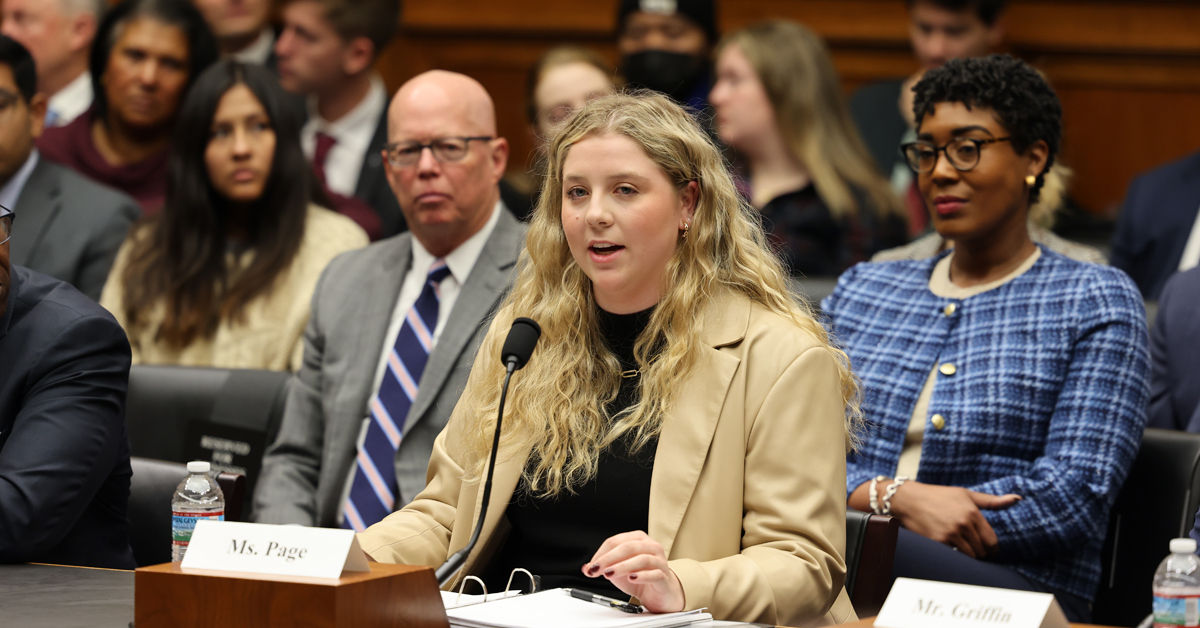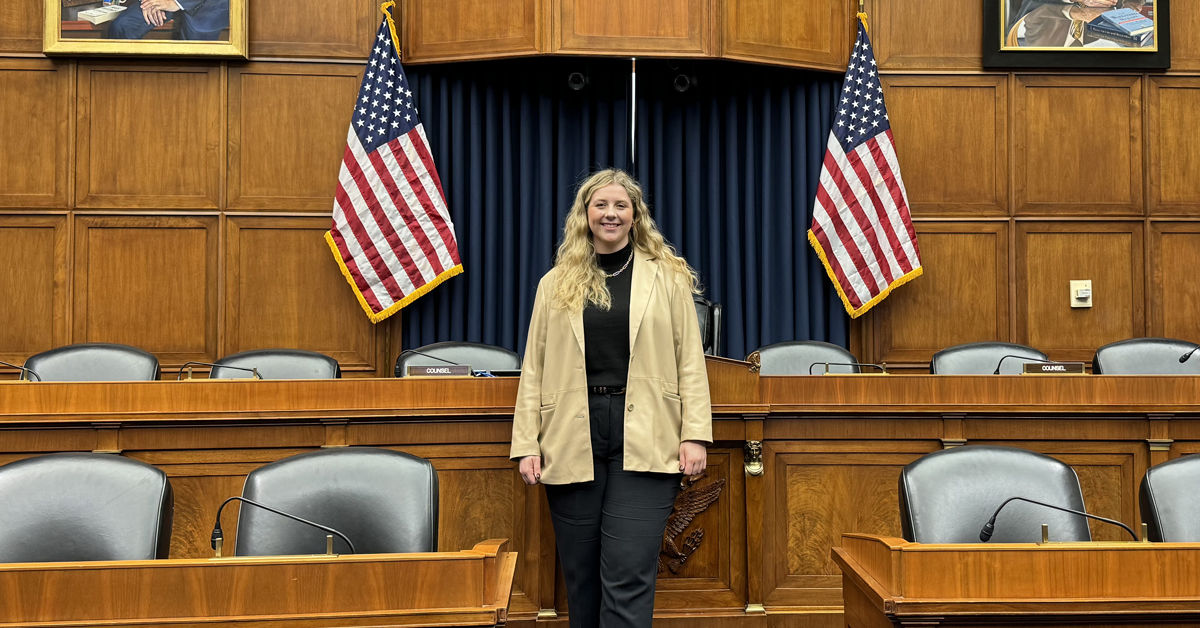Student-athlete Meredith Page testifies on NIL before congressional committee
Meredith Page had a once-in-a-lifetime opportunity to represent herself and Radford University.
Page, a member of the women’s volleyball team, testified before members of the U.S. House of Representatives in Washington, D.C., during the “NIL Playbook: Proposal to Protect Student Athletes’ Dealmaking Rights” hearing of the House Innovation, Data and Commerce Subcommittee on Jan. 18, 2024.
The native of Murfreesboro, Tennessee, and third-year member of the Highlanders joined two other student-athletes – UCLA football quarterback Chase Griffin and Michigan softball catcher Keke Tholl – as well as NCAA President Charlie Baker, Missouri Valley Conference Commissioner Jeff Jackson and Victoria Jackson of Arizona State University in testimony on Capitol Hill.
Amid a growing push to professionalize college sports, Page used her time before Congress to send a message – the opportunities afforded to athletes who participate at the mid-major level, and in Olympic or women’s sports, must be protected.
“Becoming a student-athlete in 2021 truly changed my life,” Page said in her testimony. “I have seen myself grow from an unsure girl to a confident woman with the empowerment of college athletics.
“Swimming, volleyball, tennis, soccer, track and field, and the rest on the long list of non-revenue-generating sports cannot be forgotten. It is easy to lose touch with who is behind those titles. Future doctors, lawyers, scientists, CEOs, and most importantly, the next generation of leaders. They do not deserve to get lost in the narrative.”
WATCH: Meredith Page's Testimony
Name, Image, and Likeness (NIL) is the movement that allows student-athletes to receive payments or benefits related to their status as athletes, like the rights afforded to professionals. Schools may not pay the athletes directly for competing, but athletes can receive compensation from businesses or social media platforms or from collectives, which are organizations that pool together the NIL rights of athletes from the same school (or team) and make payments to those athletes based on obligations that they fulfill.
Radford’s student-athletes can access NIL opportunities through the Highlander Exchange, a platform powered by third-party provider INFLCR.
There are no unified laws, rules or regulations that govern NIL. A patchwork of state laws and the NCAA offers broad guidance, but no uniform governance applies to all 362 Division I schools or the nearly 1,100 NCAA member institutions in all divisions. And following the recent announcement of Project DI, which includes a potential Division I subdivision that will allow for direct athlete compensation, athletes could soon become employees.
Some fear that proposed changes may lead to lost opportunities for women or Olympic hopefuls. Page was there to provide perspective as a women’s volleyball player and on behalf of an institution like Radford, which is considered “mid-major.” The NIL conversation has been typically driven by athletes and institutions from “Autonomy 5” conferences (ACC, Big Ten, Big XII, SEC, Pac-12; the Pac-12 will dissolve following the 2023-24 season).

Radford University volleyball player Meredith Page speaks to members of Congress during the "NIL Playbook: Proposal to Protect Student-Athletes Dealmaking Rights" hearing on Jan. 18, 2024 in Washington, D.C. Page was joined by Radford athletics leaders and Big South Conference commissioner Sherika Montgomery (right) during her testimony.
Page is the president of the Radford University Student-Athlete Advisory Committee (SAAC) and a member of the Big South Conference SAAC. Joined in Washington by Big South Commissioner Sherika Montgomery, Radford University Director of Athletics Robert Lineburg and Radford Associate Athletics Director for Student-Athlete Support Services Allison McCoy, Page sought to bring more inclusion to the NIL discussion.
Page sat down for a question-and-answer session following the hearing.
When did you first find out that you would be giving testimony, and what was the preparation process like?
Meredith Page: I got my invitation from Congress on Sunday (Jan. 14), and the hearing was on Thursday (Jan. 18). I had to submit my written testimony and other forms by Tuesday (Jan. 16) at 10:30 a.m. It was incredibly stressful. The first thing I did was watch three past hearings, because this was the 11th different hearing on NIL, to get an idea of what I needed to do. I had two meetings a day (with NCAA staff) until it was time for me to submit my testimony on Tuesday. It was a short turnaround to submit my testimony - I had to work through the night each night to make sure I got exactly what message I wanted to put out there. I put 19 of 24 hours those days into prep. Lots of sleepless nights.
What happened when you arrived in Washington?
MP: I met with the subcommittee Republican staff (majority party of the House). They took me into the hearing room and let me have a preview. I met in their subcommittee office, where they gave me some pointers, told me about the (timer) on the microphone, let me know how long the hearing would be, and what to expect from different congressmen and congresswomen.
Did you meet the other student-athletes who testified?
MP: I did not get to spend any time with Chase, but Keke and I had a conversation for about an hour and a half on the phone - we were going to meet in person, but then her flight got delayed. We talked about our opinions and gauged each other out – she wanted to have some reassurance from someone else in the room since she didn’t know anyone who was testifying. I knew both Jeff Jackson and Charlie Baker.

Radford University volleyball player Meredith Page poses for a photo in the U.S. House of Representatives Energy and Commerce Committee hearing room in the Rayburn House Office Building on Capitol Hill in Washington, D.C.
How do you think your message was received?
MP: I think it was received really well. I think the consensus going into the hearing was that athletes should be employees. Stepping back now, I think my message and words put some thoughts into the heads (of the representatives) and shifted the narrative on employment status. So, I’m hopeful that it will gain momentum. I think one of the main reasons I said yes to going was that I wanted them to look at somebody that this [athlete employment status] would drastically affect. To see me and know all of my accomplishments and know that this, the changing of (student-athlete) employment status, could take opportunities away for thousands of athletes.
I received really good feedback from the representatives that were there, and their staff members gave me business cards and let me know that they wanted to talk about draft revisions and continue the conversation. But also, the media surrounding (the hearing) has absolutely exploded regarding my testimony. There’s a feeling of, “How did I end up here?” My mom called me last night (Jan. 21) and said she saw me on cable news. I can’t even count the number of articles I’ve been in - it’s so amazing to see a Big South athlete, a mid-major athlete, at the forefront of this conversation. That’s normally where we’re not heard like those at Autonomy 5 schools are.
What’s next for you, and what are the future outcomes for athletes like yourself?
MP: What’s next for me is to use this momentum and put it directly into congressional engagement for the Big South Conference. I want to use all of the momentum and social media presence we have right now to continue to show that subcommittee that these are real people who you are affecting.
---
Page, a student in the Davis College of Business and Economics majoring in management, is on track to earn her bachelor’s degree in spring 2025.